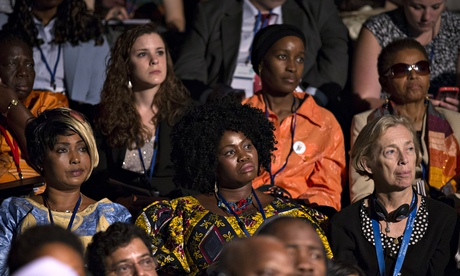
On Tuesday, the prime minister came to our school, Walworth academy in south London, to announce that teachers and other public servants like me will have a new duty to tackle female genital mutilation. Some will see this as another example of schools acting as surrogate parents, but I believe that as educators, we have a moral obligation to act. Our students should be fully aware of the risks of FGM and our parents need to be in no doubt about the stance of our school. To paraphrase RH Tawney, what a parent would want for their daughter, the state should want for all our daughters.
Tuesday’s Girl Summit on FGM and forced marriage was impressive, not just for the calibre of politicians and NGOs who were present. What really struck me was the testimony of those who had survived the barbaric practice of FGM and told us their story. I want to use their experience to transform the way we approach the issue in our schools.
There are huge pressures on teachers but I believe this is something which all of us – particularly in communities that are most at risk – have a duty to tackle. It would be easy to ignore the signs and think it is someone else’s responsibility.
This is not something that is happening purely in small villages in Somalia. In the UK there are 137,000 girls and women in England and Wales living with the consequences of FGM, and 20,000 thought to be at risk who are under the age of 15.
We have got to wake up to the issue as a country. While FGM has been illegal for decades, we are only now beginning to see real action to tackle the issue with the first prosecution going through the courts.
FGM and forced marriage are not cultural practices, they are brutality pure and simple. Teachers need to be trained to spot girls who may be at risk of FGM or child marriage and so that we are able to provide support and expert guidance to any young girl who asks for our protection.
Of course we need to talk to children in a way that doesn’t stigmatise them or their backgrounds and is appropriate to their age. I have already written to our parents and carers with information about FGM, and we will be offering a workshop for parents about keeping their girls safe.
We are organising specialist training for staff so they understand what to look out for, and we are doing an event aimed at boys where we will be reinforcing the importance of valuing women and girls.
Later this year we will organise a one day event at Walworth academy where we will ask every student to make a pledge about protecting young girls and what they personally can do to support the eradication of FGM and forced marriage.
As part of the ARK network, I hope to take the message out to our 26 other schools, and to our other schools in our community. I have invited in two FGM survivors to come and lead a discussion and then I will invite them to the ARK group of primary headteachers as primary age is the most vulnerable time for these young girls.
The summit was outward looking and had a sense of common purpose from the many countries who took part. Our duty is to take that message out to our local communities.
I have met the most amazing survivors of FGM and I have been so inspired by their courage and their strength. They are brave and courageous women and it has been a privilege to meet them. I must now use this experience to ensure we take appropriate action to support the elimination of FGM and forced marriage.

